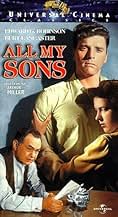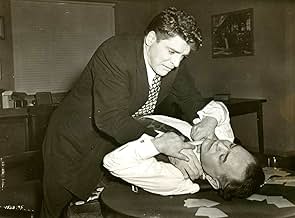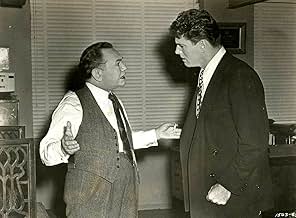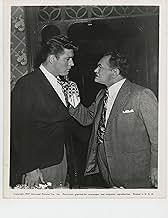Ajouter une intrigue dans votre langueDuring WW2, industrialist Joe Keller commits a crime and frames his business partner Herbert Deever but years later his sin comes back to haunt him when Joe's son plans to marry Deever's dau... Tout lireDuring WW2, industrialist Joe Keller commits a crime and frames his business partner Herbert Deever but years later his sin comes back to haunt him when Joe's son plans to marry Deever's daughter.During WW2, industrialist Joe Keller commits a crime and frames his business partner Herbert Deever but years later his sin comes back to haunt him when Joe's son plans to marry Deever's daughter.
- Réalisation
- Scénario
- Casting principal
- Récompenses
- 2 victoires et 2 nominations au total
- Frank Lubey
- (as Henry Morgan)
- Townswoman
- (non crédité)
- Jorgenson
- (non crédité)
- Mrs. Hamilton
- (non crédité)
- Bartender
- (non crédité)
- Workman
- (non crédité)
- Judge
- (non crédité)
- Halliday
- (non crédité)
- McGraw
- (non crédité)
Avis à la une
Edward G. Robinson gave us an outstanding performance as the conflicted individual, who did this for his own selfish-interests only to escape prosecution but to see his partner jailed.
This is a story of intense inter-family conflicts. The partner's daughter was to be married to Joe's (Robinson's) son Larry in the film. The picture begins with the fact that Larry is missing in action. Ann, played by Louisa Horton, is now becoming engaged to Joe's other son, Chris, played with marvelous insight by a young Burt Lancaster.
Mady Christians is also a standout as Joe's devoted wife, who herself is in denial that Larry is probably dead and knowing full well what her husband did was wrong.
This is a terrific film dealing with moral conflict and the ultimate tragic resolution to it.
You have to wonder what Edward G. Robinson had to do to be nominated for an academy award.
This is Arthur Miller at his best writing. A truly American classic.
A terrific human guilt drama that reflects family pressure and a long-living conscience. Irving Reis's family drama is neither entertaining nor strained, but quite suspenseful. The idea of keeping the mystery unwrapped till the end was certainly new for family dramas back then, or is even today. Also, World War reference and the corporate business culture during the war period fit perfectly here. Joe Keller had been accused of murdering army officers due to a faulty shipment years ago. The court and juries acquitted him and grabbed his business partner, Herb. Now, years later, Herb's daughter and Joe's son want to get married, but Herb's son learns the truth and wants his sister to stay away from Joe and his family. The girl was previously engaged to Joe's first son, who disappeared years ago, and that's why the other son can't marry her as the mother is still hoping for that son to return home. What is the truth? Well, I guess you know it by now, or you can sense it halfway while watching the movie, but that doesn't kill the suspense at all. It eventually becomes more interesting because of its consequences. Things are predictable, but never boring. Every character offers something different. Every character has a problem of its own, and that's how they get involved with each other and then find a solution. The film has terrific speed, and the screenplay makes sure you don't get away from your sofa. The tension feels real and intriguing. Edward G. Robinson is fantastic as the man of the family, the man with the guilt, and the man with the responsibility. I couldn't have imagined him and Burt Lancaster playing father and son in the 40s, but it came out so well. Louisa Horton is another star performer, along with Mady Christians. I shall give full marks to Irving Reis for keeping me hooked and gripped for 95 minutes with the drama that I thought couldn't hold me. Reis makes sure the engagement gets an intellectual and burning ending, so don't miss it.
RATING - 7/10*
By - #samthebestest.
The production style and direction (for reasons of cost and utility) let the words of Miller's play take center stage. In beautiful black-and-white, the Art and Set direction are spare, firm, and commanding. They command our attention. Miller is big on attention to the issues his characters are grappling with and their impact on the significant issues of our (and all) time.
As Miller repeats in Death of a Salesman, there are layers of meaning and understanding between his characters and the issues they confront internally and externally. The two business partners have had a long, intimate family relationship (like Cain and Able). So close a connection that his son could have married his partner's daughter. And she, of course, is the only one who has always known (from that son) the truth about the son's death. And the fact (s) about the father.
Miller shows us that the father's Horatio Alger lies are at the foundation of who we are individually and collectively as Americans; the lies can almost thoroughly wash out what individuals and a community should think about its leading citizens. It is an interesting plot twist that, as Miller's script points out, the low-class birth and poverty of the father embed him into the fabric of the community.
That the film faithfully carried Miller's message of contempt and loathing not only for the worship of that false god(capitalism) but also for the whole Horatio Alger hero myth (that both American liberals and conservatives embrace) is quite daring. Even for a film world that had not yet descended into the long night of the "Black List."
They were both guilty....
It's a wonderful story and very well performed and written, but that fact remains to be discussed.
Le saviez-vous
- AnecdotesThe original Broadway production of "All My Sons" opened at the Coronet Theater in New York on January 29, 1947. It ran for 328 performances, and won the 1947 Best Play Tony Award for author Arthur Miller. His original script was used as the basis for this movie's screenplay.
- GaffesWhen Joe comes out of the house upon Annie's arrival, he comes down the front steps and walks into the yard with his arms raised. In the next instant, he's back at the steps and his arms are down.
- Citations
Jim Bayliss: Put her to bed, Joe. Both of you go to bed. Staying up won't help; sleep will. Sleep's a wonderful thing, the best thing about living.
- ConnexionsFeatured in Film Preview: Épisode #1.1 (1966)
Meilleurs choix
- How long is All My Sons?Alimenté par Alexa
Détails
- Date de sortie
- Pays d’origine
- Sites officiels
- Langue
- Aussi connu sous le nom de
- All My Sons
- Lieux de tournage
- Santa Rosa, Californie, États-Unis(the Grace home on McDonald Avenue)
- Société de production
- Voir plus de crédits d'entreprise sur IMDbPro
- Durée
- 1h 34min(94 min)
- Couleur
- Rapport de forme
- 1.37 : 1


































